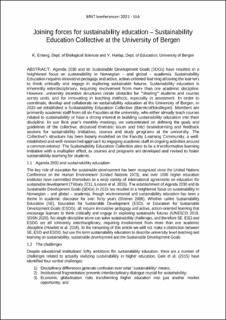Joining forces for sustainability education – Sustainability Education Collective at the University of Bergen
Journal article, Peer reviewed
Published version

Åpne
Permanent lenke
https://hdl.handle.net/11250/2764550Utgivelsesdato
2021Metadata
Vis full innførselSamlinger
- Department of Biological Sciences [2235]
- Registrations from Cristin [9791]
Sammendrag
Agenda 2030 and its Sustainable Development Goals (SDGs) have resulted in a heightened focus on sustainability in Norwegian – and global – academia. Sustainability Education requires innovative pedagogy and active, action-oriented learning allowing the learners to think critically and engage in exploring sustainable futures. Sustainability education is inherently interdisciplinary, requiring involvement from more than one academic discipline. However, university incentive structures create obstacles for "sharing" students and courses across units, and for innovating in teaching methods, especially in assessment. In order to coordinate, develop and collaborate on sustainability education at the University of Bergen, in 2020 we established a Sustainability Education Collective (Bærekraftskollegiet). Members are primarily academic staff from all six Faculties at the university, who either already teach courses related to sustainability or have a strong interest in building sustainability education into their discipline. In our first year's monthly meetings, we concentrated on defining the goals and guidelines of the collective, discussed thematic issues and held brainstorming and feedback sessions for sustainability initiatives, courses and study programs at the university. The Collective's structure has been loosely modelled on the Faculty Learning Community, a well-established and well-researched approach to engaging academic staff in ongoing activities around a common interest. The Sustainability Education Collective aims to be a transformative learning initiative with a multiplier effect, as courses and programs are developed and revised to foster sustainability learning for students.
